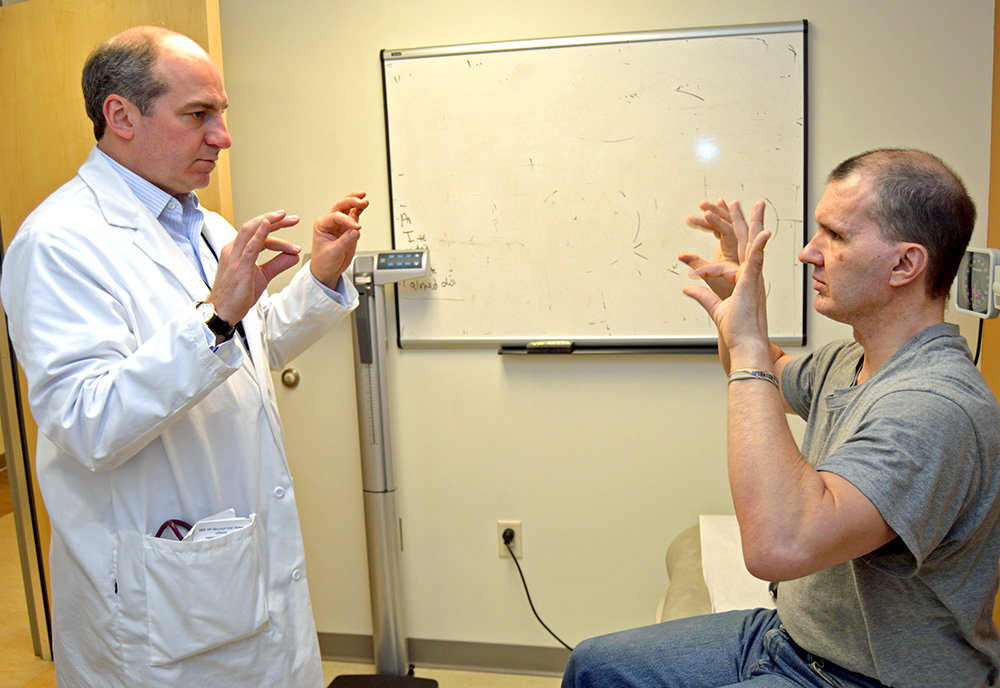Veterans Health Administration
Veterans with Epilepsy: You are not alone

Dr. W. Curt LaFrance Jr., principal investigator for a pilot study of Veterans with epileptic seizures at the Providence VA Medical Center, conducts a finger-tapping exercise with Veteran Ernest J. Avery as part of an exam at the Providence VA Medical Center. Avery served in Operation Enduring Freedom.
VA Releases Video Series on Veterans with Epilepsy
In an effort to address the stigma of epilepsy and educate Veterans, their caregivers and the general public about living with epilepsy, VA Epilepsy Centers of Excellence have developed a video series titled “Veterans and Epilepsy: Basic Training.”
The video, now available on YouTube, focuses on the diagnosis of epilepsy. Subsequent videos will include topics such as, epilepsy medications, social issues faced by individuals living with epilepsy, seizure first aid, and traumatic brain injury (TBI). The goal is to promote public awareness of the impact of epilepsy on the lives of Veterans and show that these patients are able to live full, productive and successful lives.
“There is a culture of stoicism in the military, which prevents Veterans with epilepsy from reaching out to get more information about their epilepsy. Hopefully these videos will show Veterans and all individuals living with epilepsy they are not alone,” said Stephanie Chen, epilepsy nurse practitioner with the San Francisco VA Medical Center.“I’m not a quitter,” says Veteran Matthew in epilepsy video.
Many consider traumatic brain injury, or TBI, to be the signature injury of the wars in Iraq and Afghanistan. According to the Department of Defense, 333,169 U.S. military Service members have been diagnosed with TBI since 2000, and the number is growing. In addition to symptoms such as memory problems, depression and posttraumatic stress disorder (PTSD), Servicemembers and Veterans with TBI are at greater risk for seizures and epilepsy.
“Veterans present unique challenges because their seizure-related psychosocial difficulties are often amplified by posttraumatic stress disorder and traumatic brain injury,” said Dr. W. Curt LaFrance Jr., principle investigator for a pilot study of Veterans with epileptic seizures at the Providence VA Medical Center. “Among our goals of caring for Veterans with epilepsy is developing effective treatments for these psychosocial comorbidities.”
Therapy Results in Improvement in Quality of Life
The Providence VAMC has been using a 12-session seizure therapy intervention in Veteran patients with non-epileptic seizures and with epilepsy, which resulted in a reduction in seizures, improvement in anxiety and depression, and improvement in quality of life. The treatment has been used successfully for epilepsy in non-Veterans in prior pilot trials at other facilities.
A grant from the Matty Fund, a Rhode Island-based nonprofit, in April 2015 is helping bridge treatments, research, training and education by supporting a Brown University student who worked with the study. This support is facilitating the Providence VAMC in providing seizure therapy for 20 Veterans with epilepsy in the pilot study. The Veterans will continue with existing treatment with their current care providers. Some will receive the additional seizure therapy provided as part of the study in order to compare a cognitive behavioral-informed psychotherapy with standard medical care by assessing seizures, co-morbid symptoms, quality of life and functioning.
To meet the needs of Veteran patients nationwide, VA created Epilepsy Centers of Excellence, or ECOEs, at 16 sites across the VA health care system, which are linked to four regional centers. The ECOEs strive to ensure high-quality care for Veterans with seizures, and conduct outreach, research and education efforts.
Veterans with seizures interested in seeking services at one of the ECOEs should speak with their primary care provider or neurologist who can help determine if the individual might benefit from the services provided by an ECOE, and assist with scheduling an appointment. For more information, please email ECoE@va.gov or visit www.epilepsy.va.gov.



















